

Benefits of Integrated Management System: Why You Need It. Explaining the Principles of a Management System in a Business. Why Should You Have a Shareholder Agreement for Your Business. Running a business is tough and it’s always advised to have everything well documented so that the other parties involved can’t make any fake statement.

The shareholder agreement is one vital document which, can be of great help for you when you might face any kind of dispute or litigation with your shareholders. However, drafting such a crucial agreement on your own can be a little intimidating as you need to have a clear overview on the shareholder rights in Australia as well. Hiring a knowledgeable lawyer is the most ideal option you should consider as he can offer you trusted legal counsel on the same and ensure that the document is being prepared diligently. What is a shareholder’s agreement To define a shareholder’s agreement, it is typically formed at the time of commencement of a new business organisation. Following here are the important ways explained by which a shareholder’s agreement can be purposeful for your business. Allows more flexibility Prevents disputes Saves you costs. Why Trailer Manufacturers Need ISO 9001 Certification. Risk Management System: Why Your Organisation Should Implement It.
There has been increased emphasis on risk management in business because it helps organisations to prevent all types of uncertainties including operational disruptions, reputational damages, and productivity losses.
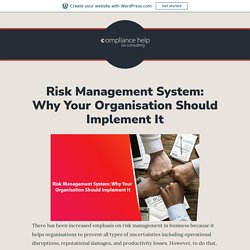
However, to do that, organisations need to develop and implement a risk management system that underlines processes for controlling or mitigating risks. Another important aspect of risk management is that you are able to analyse the root causes of risks and hence, focus on eliminating specific risks after completely aborting their causes. While effective management of risks is the prime reason for businesses to implement a dedicated management system, here we have further elaborated the importance of the system in an organisation. 4 Challenges in Cyber Security for Businesses & How to Deal. Key Difference between Quality Assurance and Safety Assurance. Why You Need Consultancy for Achieving ISO 55001 Asset Management.
An asset management system (AMS) is an imperative requirement for every business as it helps in handling their vital assets in the most sustainable way.

With an effective AMS, you can better control and manage the risks to the assets so that the demands of your investors and stakeholders related to those assets are fulfilled. The ISO 55001 asset management certification acts as a golden benchmark for your AMS. It shows your company’s continued commitment to maintaining the assets throughout their entire lifespan while ensuring maximum returns from their performance.
Are you considering the ISO 55001 certification for your AMS? If yes, then seek for expert consultancy to better know about the definite requirements of the standard and implement your AMS complying with them. Understanding the Standard’s Requirements ISO 55001 specialised consultants have an in-depth understanding of the requirements of the standard. What is the Impact of Quality Management on Business? What Do Internal Auditors Look for in Your Management System? Audits are crucial for organisations to make their business management system (BMS) ready for an ISO certification.
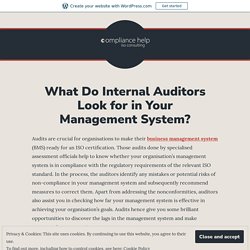
Those audits done by specialised assessment officials help to know whether your organisation’s management system is in compliance with the regulatory requirements of the relevant ISO standard. In the process, the auditors identify any mistakes or potential risks of non-compliance in your management system and subsequently recommend measures to correct them. Few Snippets on the ISO 27001 Certification Standard. The ISO (International Organisation for Standardisation) introduced the ISO 27001 certification to help businesses establish the strongest framework for their Information Security Management System (ISMS).
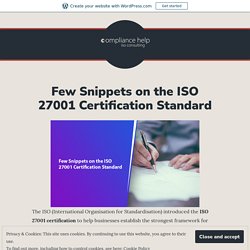
This particular standard provides ideal policies, practices, and processes to help you to best manage and use your organisation’s information assets. If you are a business owner and concerned about securing your significant information assets, then achieving this certification must be a priority. How Integrating ISO Standards Benefits the Business Management System. A successfully integrated management system eliminates all the hassles and confusions of working with numerous management systems in your business.
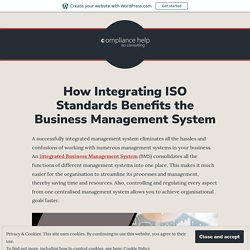
An integrated Business Management System (BMS) consolidates all the functions of different management systems into one place. This makes it much easier for the organisation to streamline its processes and management, thereby saving time and resources. An Overview on How to Implement a QA Process in an Organisation. 5 Essential Qualities of the Auditor of a Company. 5 Crucial Concepts of Quality Management in the Healthcare Sector. How ISO 55001 Asset Management Improves Productivity of Your Assets. Assets are invariably important for all business processes.
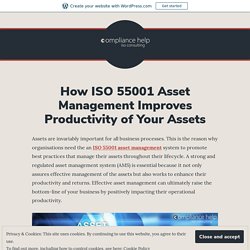
This is the reason why organisations need the an ISO 55001 asset management system to promote best practices that manage their assets throughout their lifecycle. A strong and regulated asset management system (AMS) is essential because it not only assures effective management of the assets but also works to enhance their productivity and returns. Effective asset management can ultimately raise the bottom-line of your business by positively impacting their operational productivity. What is ISO 55001 Asset Management System? ISO 55001 certification is the specific certification devised for asset management systems. Now, here’s how a certified AMS can help your business to improve the productivity of your assets. Know How to Audit a Business Process for ISO Compliance. How Does Quality Assurance Work for Businesses. Quality assurance is a broad context in businesses that helps them to systematically control their processes, minimise risks, and assure that their end products/services satisfy every requirement of the customers.
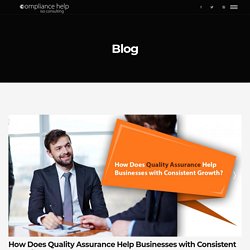
Clearly, this ensures that the approach of quality assurance helps businesses to outshine others in the competitive market by focusing on customers’ expectations. Here, in this article, we aim to describe how quality assurance works for businesses, helping them to not only satisfy customers but also boost their growth in the long run. Quality Assurance (QA) is not an independent or standalone concept for your business. It is a part of the overall business management system which encompasses specific procedures and practices for monitoring and improving the products/services. No doubt, ‘quality’ is a critical success factor for business, assuring which help you to stand out. Quality Management Implementation Steps: Here is a Complete Guide. Businesses that have a particular management system for quality are found to prosper more than the ones that do not.
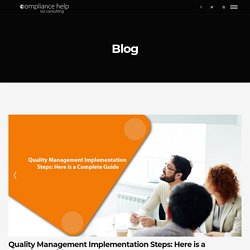
A well-conceived and structured Quality Management System (QMS) enforces a set of ideal practices across the organisation’s processes and departments. Those practices when followed rightly intend to improve the quality of their final products or services and build the credibility of their business. While for this reason a QMS is now regarded as an indispensable part of business strategy, many organisations are perplexed with the complicated quality management implementation steps. Moreover, ineffective implementation of the QMS results in certain expenditures of your organisation but without resulting in any quality improvement. A Quick Overview of the ISO 55001 Asset Management System. Business assets can be of any shape, size, or type.
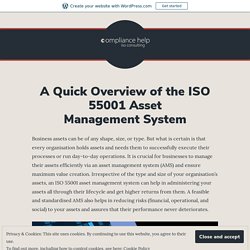
What Does ISO Stand for In Businesses and How They Get Benefitted? The International Organisation for Standardisation, also known as ISO, is the international independent body that provides quality assurance, safety, and management standards for businesses. Achieving those standards helps a business to demonstrate its compliance to the highest, globally accepted regulations that assure quality, reliability, and efficiency of their products or services. If you are not aware of what ISO stands for in business or how it benefits a business, this blog is a perfect piece to read. ISO standards are technically defined as the documented requirements that include guidelines or specifications for organisations. Following them consistently helps them to ensure that their processes, resources, products, or services are completely fit to fulfil their stakeholders’ expectations. What are the Useful Effects of QMS Implementation on an Organisation? The cornerstone of every successful organisation that manages to fulfil the expectations of its customers and other stakeholders group is a Quality Management System (QMS).
An effective QMS is a big necessity for all businesses today, even small-sized enterprises because it helps them to persistently enhance or maintain the quality of their products or services. The answer to the common question i.e., what are the effects of QMS on an organisation is hence straightforward! It helps an organisation to raise the quality and value of their products or services, satisfy the customers better, and achieve consistent growth. How ISO 55001 Asset Management System Helps Your Organisation.
How ISO 45001 Certification Helps Achieving Occupational Health & Safety. Employees are the best asset of your company. Therefore, always make your employees’ health and safety a priority. ISO 45001 Standard can help you ensure your employees’ health and safety, as it is an international standard that has specified certain requirements for an occupational health and safety management system. It also provides guidance on its ability to enable businesses to improve their Occupational Health and Safety Management and prevent occupational injury and sickness. Any organisation, regardless of its size and type, can implement this standard to integrate other aspects of health and safety.
By implementing this standard, you can achieve ISO 45001 Certification. A QMS Checklist for ISO 9001 Certification. It is essential for businesses of every size to have a comprehensive quality management system (QMS) implemented based on the internationally acclaimed standard, ISO 9001. However, once you start with the journey towards implementing a QMS that is certifiable to this ISO standard, you might get lost or confused between the numerous inevitable tasks involved in it. That is why here we have provided you with a checklist of the entire process to keep you going in the right direction. The purpose of preparing the checklist is to make the process short and precise, by fragmenting the entire implementation journey into a few steps.
Check out the steps to implement the QMS in the following section. Step 1: Management Readiness If you want to implement an independent QMS aligning with your business processes, you need complete support of the organisation’s top management. Step 2: Map Out the Quality Requirements. Discovering the Key Difference between an EMS and a QMS. If you are a business owner and want your products or services to be of the best quality in the market, you need a strong, certified, quality management system (QMS).
However, only assuring the quality of your products or services is not all. You also need an efficient environmental management system (EMS) to ensure that production and consumption of products or services do not cause any damage to the natural resources and result in harmful consequences on the environment. In other words, both an EMS and a QMS are equally necessary for businesses to make their products or services capable of satisfying their customers. It is clear that there is a huge difference between EMS and QMS in their approach even though both are related to improving products or services for ensuring higher customer satisfaction.
Uncovering the Structural and Functional Difference between EMS and QMS Definition Approach Best Practices The difference between the QMS and EMS are mainly observed in their best practices. Guide to Implement an EMS Based on ISO 14001 Standard. At Compliancehelp, we follow a simplistic approach to help businesses get ISO 14001 certified quickly. Consultation & Training We have specialised ISO 14001 certification consultants who help you understand the environmental policy underlining your industry. An organisation’s commitment to meeting policy requirements will help to manifest its commitment to environmental protection. These requirements will subsequently assist management in precisely planning for an EMS by aligning with the policy. How to Get ISO Certification Fast and Cost-Effectively. Find the Difference between Quality Control and Quality Assurance. Quality control and quality assurance are two associated concepts but there are sharp differences between them.
Learn About 4 Industry-Wise Quality Management Systems. 4 Critical Challenges Faced by Businesses in Quality Management. 5 Inherent Benefits of ISO 9001 Quality Management System. The success of a business is inevitably driven by the quality level of its products or services. The more superior the quality of products or services offered, the more you can retain customers. Quality Assurance Document Management: Why It is Needed. Getting Your Environment Management System Ready for ISO 14001. Amongst the family of ISO standards, ISO 14001 addresses the environmental issues or impacts of businesses which help in minimising the harm to nature, reducing exhaustion of natural resources and enhancing future sustainability. Achieving the ISO 14001 certification for your organisation requires you to get a strong and unified Environment Management System (EMS) which takes care of all your business aspects (internal and external) that have considerable impacts on the environment.
The potential benefits of the certification are multiple and remarkable! From minimising the harmful environmental impacts to proving your capability to fulfil CSR (Corporate Social Responsibility), your company can achieve a lot with this global environmental certification. As the certification gives reassurance to customers or other stakeholders that your business is concerned about incorporating greener practices, it can create a competitive edge in the market. Identify Legal and Compliance Requirements. Why Business Needs a Standardised Quality Assurance Program. Quality assurance programs or processes can be the saviour for your business. It helps prevent you from having any flaws or problems in your products/services or any functional areas. If you ask what the importance of quality assurance in businesses is, the answer is simple.
It is to make sure that the customers are delivered with the best quality and consistent products or services which meet their every expectation or need. Transitioning Health and Safety Management System to ISO 45001. Companies need a strong, all-inclusive health and safety management system to improve their employee safety and minimise the chances of accidents or illnesses at their workplaces. An occupational health and safety (OHS) management system is not really effective unless it is structured well and adheres with the international regulations related to workplace safety.
ISO 45001 is the top international standard for OHS management systems and it defines regulations for organisations to address the work-related injuries, risks of illnesses, and fatalities. 5 Ways a Business Management System Can Aid Your Company. Why to Adopt ISO 13485 Standard for Your Medical Business. Information Security Concerns in Business & Importance of ISO 27001. Key Benefits of ISO Certification for Business Management. Why Does Occupational Health and Safety Matter in Organisations?
5 Key Steps to Develop a Health & Safety Management System. Why Quality Management in Business is More Important Today. How to Integrate ISO Standards into Your Business Management System. Make Your Way to ISO 9001 Certification with This Simple Guide. Why Information Security is Important & What to Do About It? 5 Compelling Tips for Quality Management in Manufacturing. How ISO Standards Will Improve Your Business Management System. All About Information Security and ISO 27001 Certification. Compelling Reasons to Go for ISO 27001 Certification. Step-by-Step Guide to Improve ISO Compliance of Quality Management System.
This Christmas Bring a Positive Change in Your Business with a Brand New QMS. How Does A Quality Management System Contribute to Growth in Small Businesses. ISO 31000 Risk Management System for Your Business. Achieve ISO 9001 Compliance for Quality Business Management. Time to Include a COVID-19 Policy in Occupational Health & Safety Management System. How Does ISO 14001 Certification Ensure Long-term Environmental Sustainability.